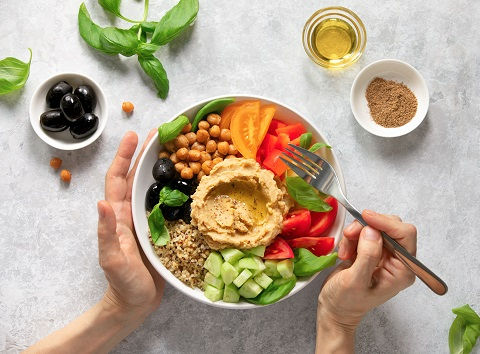When it comes to caring for your heart, what you eat can make a world of difference. But for some people, sticking to a heart healthy diet can be a struggle. Atlantic Health System cardiologist Cindy Codispoti, DO, offers some tips on how some simple changes can boost your cardiovascular health, give you more energy, ward off dementia and reduce your risk of cancer.
The benefits of a heart healthy diet
Around the world, there are places where people live extraordinarily long and healthy lives, largely unaffected by heart disease, obesity, diabetes, cancer and dementia. Research has shown that their longevity and wellbeing are strongly linked to a diet that’s high in fiber, whole grains, lean protein and monounsaturated fats, with limited sodium, sugar, red meat and saturated fats.
“The benefits of this style of eating extend beyond your cardiovascular health,” explains Dr. Codispoti. “There’s a large body of research that shows us that moving away from processed foods that are high in fat, sugar, sodium and preservatives can be a huge boost to your overall well-being.”
Unlike fad diets that help you shed pounds by severely restricting calories or eliminating specific food groups, a plant-focused diet that’s rich in fiber and lean protein can become a sustainable lifestyle. The benefits include lower blood pressure, cholesterol and blood sugar levels, as well as reduced oxidative stress and chronic inflammation, which have important roles in the development of conditions such as diabetes, cancer and heart disease.
Making better food choices
Dr. Codispoti is a promoter of the Mediterranean diet. However, she acknowledges that when discussing healthy food choices with her patients, a diet label may feel limiting to people from different cultures.
“One of the best things about this style of eating is that it’s so adaptable. Patients do not necessarily need to eat Greek or Italian food,” she explains. “I encourage my patients to use some of the cooking techniques and general principles, but also add their favorite spices or ingredients they enjoy.”
A heart healthy diet includes plenty of:
- Fiber-rich foods including fruits and vegetables
- Lean sources of protein such as fish, chicken, turkey, beans and legumes
- Whole grains that are found in some breads, pastas, cereals and crackers
- Monounsaturated fats contained in olive oil, avocados, nuts and seeds
Ingredients to limit or avoid include: - Processed foods
- High-fat foods
- Red meat
- Sugary snacks and sweetened beverages
- High-sodium foods
To help ensure you have healthy food choices at hand, Dr. Codispoti recommends advanced meal preparation and planning. What that looks like for each person can be different, but she suggests washing and cutting fruits and vegetables so they are easy to grab for meals and snacking, as well as preparing a few healthy meals in advance.
“As a busy mom with a career, I understand the need to have healthy meals ready to go,” says Dr. Codispoti. “I like to turn on some fun music and set aside an hour or two on the weekends to plan and cook meals in a way that makes the process enjoyable. It’s a game-changer for the rest of the week and I know I’m doing something great for my family.”
Does it really matter what I eat?
Cardiovascular disease is the leading cause of death for men and women around the world. But you don’t necessarily need to completely overhaul your current eating habits to improve your heart health. A few simple lifestyle changes, including alterations to your diet, quitting smoking and increased exercise, can help reduce or eliminate your risk for heart disease or a cardiovascular event such as a heart attack or stroke.
“Adopting a heart healthy diet might not be easy for everyone and I often tell my patients that just leaning toward a more colorful diet with plenty of fruits and vegetables can be beneficial,” says Dr. Codispoti. “When combined with moderate activity and portion control, there’s no doubt you’ll shed weight and feel more energized.”
Be proactive about your health
Staying up to date on annual wellness exams and screenings is important. So too, are the occasional trips to specialists to address sleep issues or any other health concerns that are nagging you.
Know your risk for heart disease in 2 minutes
Take the quiz













